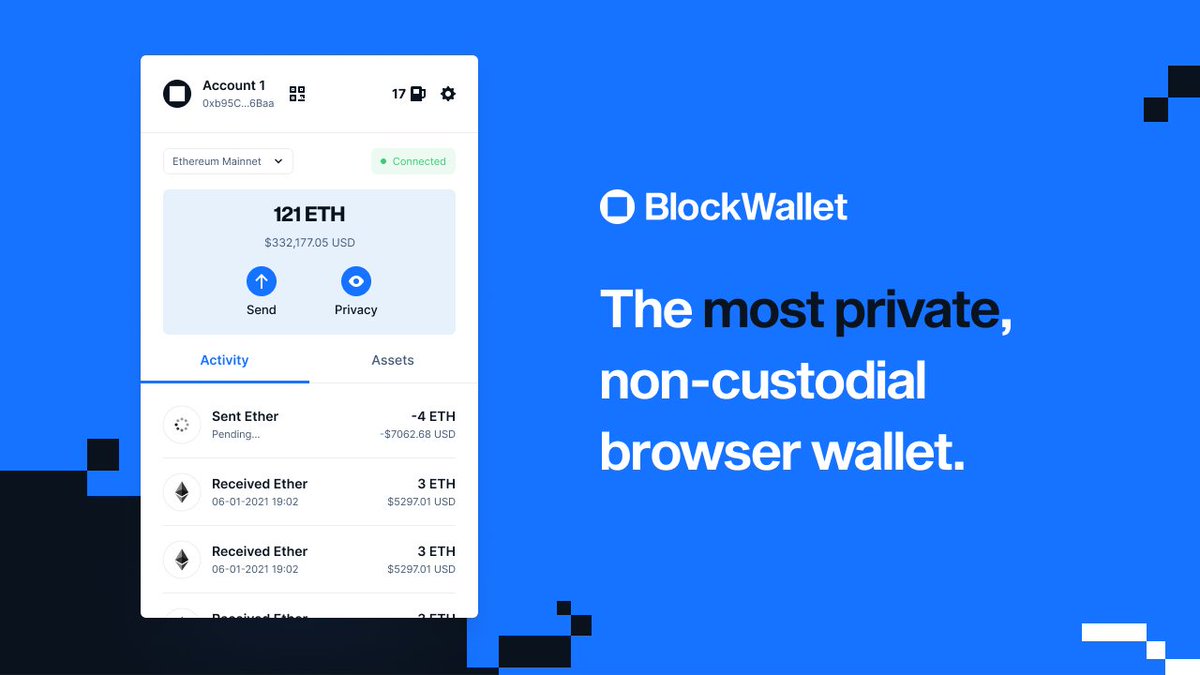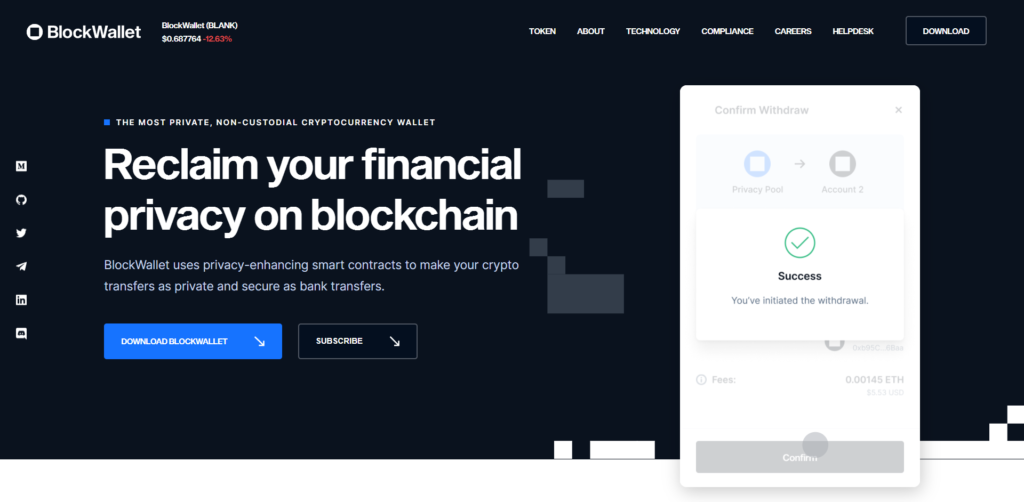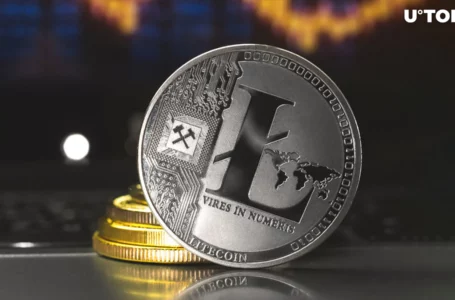
The Crypto BlockWallet project is the first crypto wallet that protects you on the web3 without any compromises, the wallet hides your financial information by mixing transfers with the BlockWallet pool of funds. This ensures that external transfers remain anonymous. Each additional transfer you make increases your privacy.
Only you can see, access and manage your funds. Your wealth is pooled with other people’s in a smart contract so that no one can track ownership of the capital except you. Keep reading and learn more about BlockWallet.
What is the Crypto BlockWallet (BLANK)?
BlockWallet is the most private and non-custodial browser extension wallet where users can store funds and interact with their favorite blockchain apps privately.
As crypto is embraced by the mainstream, blockchain’s lack of privacy poses real security risks for beginners and enthusiasts alike. BlockWallet is here to ensure that on-chain privacy is not left behind. The wallet provides a suite of advanced privacy tools wrapped in a familiar and friendly wallet experience, eliminating the friction faced by millions of users and making privacy accessible to everyone, everywhere.
Blockwallet uses battle-tested privacy-enhancing technology to protect your financial data. When you transact or interact with blockchain applications, requests are sent through Privacy Proxies by default, hiding the IP address and other metadata, which can be used to identify the user. You can also use the Privacy Pools feature, powered by zk-SNARKs technology, to deposit and mix funds into a smart contract. This allows the transfer of funds without links to your history and identity on the blockchain, effectively making them untraceable.
Anyone can easily install BlockWallet and start reaping the benefits. In addition to full privacy functionality, BlockWallet comes with a variety of features that go beyond privacy for a seamless user experience. With full support for Web 3.0, the wallet allows you to connect to any dApp and harness the power of the decentralized web.
What is the differential of the Crypto BlockWallet Project (BLANK)?
BlockWallet uses smart contracts to ensure only authorized owners can access and manage funds. All information about how assets were deposited into the account is visible only to the wallet owner. There is an option to hide or show the wallet balance for third party users.
BlockWallet does not know its customer procedures (KYC). Past activity is not logged, so every time a user needs to withdraw or send funds, they start from scratch. BlockWallet also has a user-friendly browser extension, ensuring high efficiency and anonymity. BlockWallet has been an open source project since its original public release.
Name change: from Blank Wallet to BlockWallet
Blank Wallet has changed brands and is now known as BlockWallet. The only thing that has changed at this point is the name. The logo and established branding remain the same. The BLANK token and contract address will also remain unchanged. At the website, you can find an updated roadmap.
“Block” is a native term in the blockchain space and is a very fundamental thing as far as technology is concerned. The team believes that privacy, security and usability should be the foundation upon which user interactions are built on Web3. This point sums up why they decided to rename to BlockWallet.
How to use BlockWallet: Browser Extension?
Scroll to the website from BlockWallet and click the “Download” button in the upper right corner. This will take you to the Chrome store where you can install the wallet extension. The BlockWallet browser extension is currently available on Google Chrome, Brave, Microsoft Edge and Opera.
- Store, send and receive crypto.
- Use privacy pools to avoid revealing your main wallet.
- Interact with blockchain applications privately through BlockWallet Privacy Proxy and avoid revealing your IP address or other metadata used to identify you on Web3.
- Use built-in front-running bot protection to prevent sandwich attacks.
- Transact and interact with Web3 apps on Ethereum, Binance Smart Chain, Avax, Fantom and Polygon.
Crypto BlockWallet projects that are ongoing
There are many items in the works to help develop BlockWallet as a product and a project, the team is focused on scaling BlockWallet’s user base, implementing even more features and functionality, and growing the community.
Some of the projects include:
- staking launch
- NFT drop
- Adding Hardware Wallet support
- Implementing the Phishing Prevention feature
- Implementing the Private Pools feature in more networks
- Implementing the Swaps feature
Crypto BlockWallet Project: Available Resources
phishing protection
Learn about the phishing protection feature. BlockWallet combats a well-known scam where users are tricked into logging into a fake wallet that is a mirror of a real wallet. Now, BlockWallet will generate a unique piece of artwork on the “Login” and “Import/Export Account” pages of your wallet, so you always know if it’s a real deal.
This feature is fully integrated into the wallet, so you don’t have to do anything but keep it and remember what your unique artwork looks like. Be sure to check your artwork whenever you need to enter the password. It is important to note that if you interact with your BlockWallet and it does not display its unique anti-phishing artwork, it is very likely that you are the victim of a phishing attempt and avoid using the wallet. Instead, reach out to the Community Managers on Telegram or Discord for further guidance.
Hardware wallet support
Connect your Ledger or Trezor with BlockWallet with features you need to stay safe on Web3. Since the launch of BlockWallet, hardware wallet support has been the missing piece and top priority. BlockWallet has completed thousands of tests over the last few months to deliver a flawless release, testing internally with the team and then transitioning to a beta program with the community. The result is a tried-and-true integration that you can try right now. Support is currently offered for Ledger and Trezor hardware wallets and they plan to integrate Keystone in the near future.
BlockWallet Bridges
BlockWallet users can now explore cross-chain EVM opportunities with ease. Make Bridges quickly with just a few clicks, make Bridges cheaply with the best quotes on the market and make Bridges with peace of mind, avoiding fraudulent websites. Thanks to the advanced Bridge aggregation of Li.Fi with DEX connectivity, BlockWallet users get the best possible quotes when bridging.
Custom swaps and networks
BlockWallet users can now easily connect to any EVM-compatible network or complete free token exchanges directly in the wallet. Swaps and custom networks were launched all at once, allowing BlockWallet users to effortlessly connect to any EVM-compatible chain or swap tokens directly within the wallet.
With this new features you can now quickly exchange your tokens without leaving your wallet. This means no exchanges and no wallet connections required. They are also extending support to any EVM network, opening the door to many more users. And just like swaps, they are adding their own twist to ensure users get the best wallet experience.
BLANK token
BLANK is a utility token for the BlockWallet wallet ecosystem and community. The token has a total supply of 125 million allocated to public/private sale, marketing, adoption, founding team, advisors and future development investors. Its holders contribute to the growth of the portfolio through the provision of liquidity and other activities within the network. Let’s explore the main use cases for the BLANK token.
- Discounted Transaction Fees — Blank charges a fee in exchange for its privacy features. Fortunately, BLANK holders enjoy a discount on costs. However, the discount depends on the number of tokens held. For example, users with at least 1.000 tokens get 10% off, while users with 10.000 tokens get 25% off.
- Token burn — One-third of the fees charged in the ecosystem are used to buy back and burn BLANK tokens, reducing the circulating supply and positively impacting their value.
- Reward Liquidity Providers (LPs) — A decentralized exchange (DEX) feeds the BlockWallet liquidity pool. The platform uses one-third of the fees charged to incentivize LPs to interact with the ETH/BLANK pool on Uniswap. However, the amount earned depends on the amount contributed to the pool.
- Rewarding Referrals — Blank runs a referral system that distributes rewards in the form of BLANK tokens. Beneficiaries include partner news outlets, influencers, blogs, wallet users and airdrops.
- Exclusive access — The platform also has features that only BLANK owners can enjoy.
Final Thought
BlockWallet is a private, non-custodial browser wallet. According to the team behind it, “BlockWallet fights friction and centralization” and will help protect its users’ right to privacy. BlockWallet handles all crypto transactions confidentially. It creates a new wallet address with the required amount of crypto whenever a user decides to withdraw funds. BlockWallet’s BLANK utility token is expected to ensure the platform’s liquidity and secure its place in the decentralized finance (DeFi) space.



















